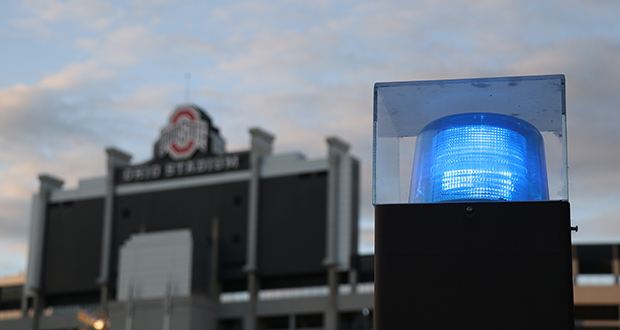
U.S. Supreme Court denies Ohio State’s cert petition Monday. Credit: Katie Good | Lantern File Photo
The U.S. Supreme Court denied Ohio State’s appeal on a case brought by survivors of sexual abuse from former university physician Richard Strauss Monday.
Ohio State’s petition asked the court to strike down the previous ruling from the United States Court of Appeals for the Sixth Circuit that allowed survivors to sue the university, despite Ohio’s two-year statute of limitations for sexual abuse. The petition was supported by 23 universities and the Association of American Universities.
Ohio State said they petitioned in order to uphold the Supreme Court’s “long-standing commitment to statutes of limitations that begin when an injury occurs” since the abuse occurred decades ago and to “[p]reserve Title IX’s protection of students who are denied educational opportunities or benefits – rather than individuals who visit campuses for other reasons,” according to a statement on the university’s website regarding the case.
“Ohio State is disappointed by the United States Supreme Court’s decision not to review a case involving Title IX claims that has a significant legal impact on colleges and universities across the nation as well as their students,” university spokesperson Ben Johnson said in an email.
Strauss was hired as the team doctor for 17 varsity sports and a physician at the university’s Student Health Center in 1978 with complaints about his conduct first heard the following year. He was let go from the university nearly two decades later and died by suicide in 2005.
A 2019 independent investigation into Strauss’ conduct found that at least 177 male students had been sexually abused and that university officials were aware of the abuse and failed to prevent or address it. Survivors filed lawsuits beginning in 2018, according to the university’s website. Over 500 individuals have filed.
Ohio State individually settled with more than half of the plaintiffs for more than $60 million. The court’s decision allows the remaining lawsuits to stand.
The survivors’ legal team celebrates the court’s denial, as it will prevent the blocking of lawsuits from survivors in relation to the abuse — consisting of more than 200 men.
“We are very pleased that the Supreme Court has denied OSU’s cert petition. We look forward to returning to the trial court, having our clients’ stories heard, and gathering further evidence of OSU’s widespread cover-up of Dr. Strauss’s serial predation,” the team said in a statement. “For decades, OSU has attempted to run out the clock on its accountability and protect its reputation through a series of actions aimed at hiding its role in perpetuating the serial sexual abuse that OSU students and others experienced on the university’s watch.”
“Now, after more than four decades, we are one critical step closer to justice for the survivors and to bringing about meaningful change for current and future generations of OSU students,” the statement continued.
Johnson said this petition did not change Ohio State’s commitment to survivors.
“Ohio State is a fundamentally different university today than when Strauss was employed and over the past 20 years has committed substantial resources to prevent and address sexual misconduct,” Johnson said.
Steve Snyder-Hill, a survivor of sexual abuse by Strauss and one of the plaintiffs in the case, said on Twitter following the petition’s denial that OSU cannot escape their culpability in the doctor’s sexual abuse.
“They knew, they covered it up. Just like Judge (Michael) Watson said, there is no doubt their role in this,” he wrote.


